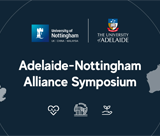
COP26: a rallying call to us all
November 2nd, 2021
Professor Dame Jessica Corner is leading a small delegation from the university at the United Nations Climate Change Conference. Here she shares her thoughts on tackling the climate crisis and highlights how our discoveries are delivering solutions to the greatest challenge of our time.
COP26 could mark a turning point in the future of our planet. At the 26th United Nations climate change conference, the world’s leaders will strive to reach agreements to address the devastating impact of human behaviour on the climate and the threat this poses to future generations.
Universities are at the vanguard as the UK grapples with this daunting challenge. Our experts alerted the world, gathering evidence that incontrovertibly proved the planet is warming at an alarming rate, and underlined that we must urgently end our dependence on fossil fuels. Secondly, we are drivers of change. At COP26, policymakers will ask: how do we restore nature and biodiversity and reduce pollution, yet safeguard future prosperity and ensure the actions we take are fair and inclusive?
Our commitment to sustainability
At the University of Nottingham, our researchers are inspired and driven by these challenges. We have a long-standing commitment to sustainability and this informs every aspect of our mission – to change lives though transformative discoveries and to inspire future generations.
Ahead of COP26, we joined 140 universities across the UK to back a new set of commitments on climate action. We are fully behind the UK’s aim to reach net zero by 2050. Our own target is to reduce our carbon emissions by 63% by 2030 and we support the city of Nottingham’s ambition to be a net zero carbon city by 2028.
Our strategic response to global challenges
We also reaffirmed our pledge to champion the UN Sustainable Development Goals (SDGs). Our Beacons of Excellence were created in 2017 to bring researchers together from across disciplines and accelerate our strategic response to global challenges. Our six beacons address the 17 SDGs, which include clean energy, climate action and sustainable communities. Two beacons, Green Chemicals and Propulsion Futures, are having a direct impact in progress towards net zero: securing a skills-rich bioeconomy and the greening of aviation.
To address such a complex and multi-faceted challenge as climate change demands coordinated action, drawing together expertise from a rich range of disciplines and partnerships.
At COP26, for example, as Europe’s leading aviation research university, we are highlighting our research in support of net zero aviation, which spans clean aircraft technologies, propulsion systems and fuels, to advances in sustainable materials and manufacturing, as well as more efficient flight and airport operations.
Real progress demands collaboration
To deliver real progress on climate change also demands collaboration between government, academia and industry. At Nottingham, our new £40m power electronics building, home to the UK Electrification of Aerospace Propulsion Facility, is an exemplar of such shared purpose. This 20 megawatt test bed is unrivalled in the world and here our researchers work with industry to deliver revolutionary electric propulsion systems. Part funded by the government’s Getting Building Fund, the UK Research Partnership Investment Fund and matched with £20m from our UK industry partners, it will provide a step-change in the UK’s capacity available to test electric motors and generators at the scale needed to reach ambitious decarbonisation targets.
Our researchers from our Future Food beacon will highlight the challenge of feeding a growing population in the face of climate change. This challenge, from developing more resilient crops in the face of drought to improving access to nutritious foods for marginalised communities, is a stark reminder that already vulnerable societies are most at risk from global warming. To find fair solutions and build capacity for innovation at local level, we share knowledge with our partners in Africa, South America and Asia, from the small-holders of Tanzania to cocoa producers in Columbia, who have in turn linked up with a vegan chocolate-making enterprise in Nottingham.
A green industrial revolution
To achieve a zero carbon future we must deliver a green industrial revolution. The building blocks of this revolution are molecular – by using bacteria and biomass to create carbon-neutral materials, chemicals and fuels, and working with industry to scale up these platforms, our Green Chemicals beacon will help create a circular, skills-rich bioeconomy that reuses and recycles materials, targets waste at the atomic level and ends industry’s long and devastating relationship with fossil fuel.
Success at COP26 may rest on reaching agreement over how best to secure clean, affordable energy. Our Energy Institute brings together 150 engineers, scientists and social scientists and works with industry and government to secure solutions. We lead the Trans-Mid project, which brings together regional universities and transport technology firms and suppliers to the rail, road and aviation industries to eliminate C02 from transport manufacturing and the logistics supply chain. At the conference, our energy researchers will show how a neighbourhood energy bubble in Nottingham is lighting the way for local, efficient power generation and storage, and smart empowers householders while cutting bills and emissions.
Providing science, data and expertise
This will be one of a number of briefs for policymakers we will share in Glasgow, from how COP26 can deliver for vulnerable city communities, to breaking the links between modern slavery, environmental degradation and climate change.
Such research provides the UK and international leaders with the science, data, expertise and insights they need to agree on a way forward. With support from our Institute for Policy and Engagement, we will further promote our discoveries, inform debate and seek to influence policies.
Rallying call to us all
We will work hard to strengthen partnerships and spark new collaborations – only by acting together, with urgency, can we overcome this crisis.
The United Nations conference on climate change is a rallying call to us all. At no time in history has humankind been at a crossroads and knowingly faced a choice with such profound consequences for the lives of generations to come. But thanks to science, and unparalleled abilities to assemble and interpret data and share this knowledge, we have never been better equipped to agree a way forward.
Learn more from our inspiring researchers in a series of thought-provoking blogs and podcasts on our COP26 web pages, and please look out for #TogetherForOurPlanet to follow our daily contributions to the talks in Glasgow.
COP26 activities and events at the university
Throughout COP26 we are highlighting how our staff and students can get involved and make a difference. There are events, activities and opportunities to take part in, starting Friday 29 October with a Low-waste Living Workshop. We’ll be focussing on key themes which underpin the goals of COP26 and reaching net zero.
Find more on our Sustainability webpages.
Tags: COP26
Leave a Reply
Other
Trusted Research update: changes to technologies requiring an export control licence
The UK Government has issued an updated UK Strategic Control List, introducing additional export control measures […]

Adelaide-Nottingham Alliance: join Vice-Chancellors at event celebrating global partnership
Staff, students and researchers are invited to join the Vice-Chancellors of the University of Nottingham and […]

